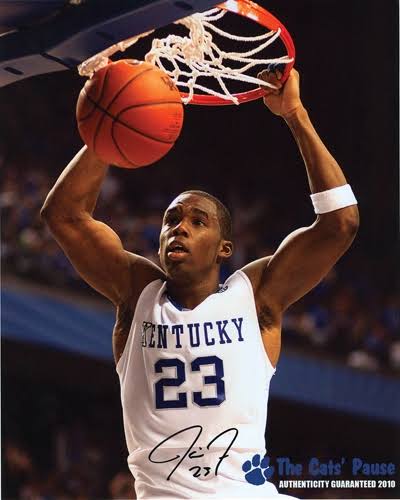In Kentucky basketball lore, some stories are legends. Others are regrets. And then there’s the painful middle ground — the “what ifs.”
None may sting quite like this one:
What if Jodie Meeks had returned for his senior season?
A New Era, Missing One Piece
The 2009–10 Kentucky Wildcats were a force of nature. It was John Calipari’s debut season in Lexington, and he brought with him the No. 1 recruiting class in the country. The roster was stacked: John Wall, DeMarcus Cousins, Eric Bledsoe, Patrick Patterson, Darius Miller — a team dripping with NBA talent and Final Four potential.
But there was one glaring weakness: shooting.
Kentucky could do everything — except reliably hit shots from deep.
Enter Jodie Meeks. Or rather… imagine if he’d never left.
Meeks Was the Missing Weapon
During the 2008–09 season, Jodie Meeks was Kentucky’s flamethrower. He averaged 23.7 points per game, shattered Dan Issel’s long-standing single-game scoring record with 54 points at Tennessee, and nailed 117 three-pointers at a 40.6% clip. He was the shooter. The one Calipari never got to coach.
Meeks had declared early for the NBA Draft, leaving a Kentucky team in transition. After two chaotic seasons and three different coaches, Meeks wanted stability and a pro opportunity — and he got it. He carved out a solid NBA career, but his departure left a question hanging over Lexington.
What if he’d stayed one more year?
Calipari’s Roster Overhaul Left No Room
When Cal arrived, he cleaned house. Meeks left the door open to return, but Calipari had already begun reshaping the program around a new core. Five-star freshmen flooded in. The pace was fast, the expectations even faster. Meeks, unsure of his role under yet another coach, officially moved on.
But if he had stayed, the impact could’ve been immediate — and historic.
The West Virginia Game — and the Collapse
March 27, 2010. Elite Eight. Kentucky vs. West Virginia.
The Wildcats had dominated most of the season, but in this game, their flaw was fully exposed. The Mountaineers packed the paint, daring Kentucky to shoot.
The result?
Kentucky shot 4-for-32 from three.
Wall and Bledsoe combined to go 7-for-27 from the field.
Final score: West Virginia 73, Kentucky 66.
They didn’t just lose — they lost because they couldn’t shoot.
And that’s where Meeks — even on an off night — might have changed the outcome. He had 18 games with 4+ threes his junior year. Even three triples could’ve cracked the zone and opened the floor for Wall’s slashing and Cousins’ post work. His presence alone could’ve forced Bob Huggins’ defense to stretch.
Could Meeks Have Delivered a Championship?
That Kentucky team had it all:
✅ Size
✅ Speed
✅ NBA firepower
❌ Perimeter shooting
It’s not far-fetched to say Meeks could’ve been the difference between an Elite Eight exit and a national championship. He would’ve filled the one void that held them back — a seasoned, confident shooter who could rise in the moment.
Think Lee Humphrey for Florida, Kyle Guy for Virginia, or Doron Lamb for Kentucky in 2012. Meeks could’ve been that guy — two years earlier.
A Decision That Made Sense — But Still Hurts
Jodie Meeks didn’t betray the program. He made a smart decision for his career. But that doesn’t stop Kentucky fans from dreaming about what could’ve been.
It’s one of those sliding doors moments in college basketball:
Had Meeks stayed, would Calipari have won his first national title before Anthony Davis ever arrived?
Honestly — yes, he might have.
Final Thought
The 2010 Wildcats were a juggernaut, missing one vital ingredient. Meeks was that ingredient.
Basketball history often turns on small decisions. One more year, one more shooter, one more deep three — and the banner might read 2010 National Champions.
But instead, it reads something else:
“What if?”

